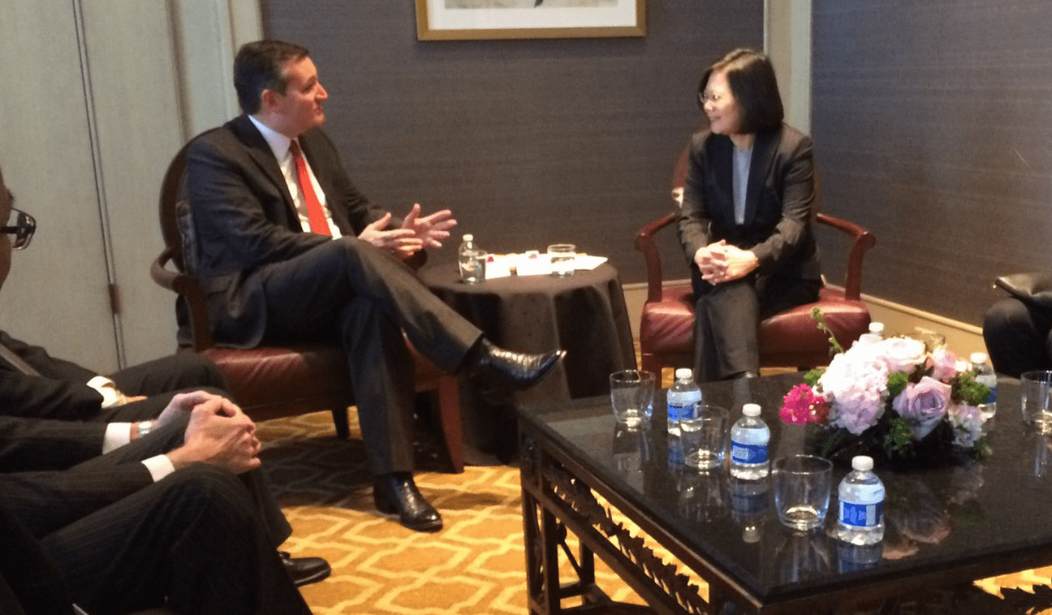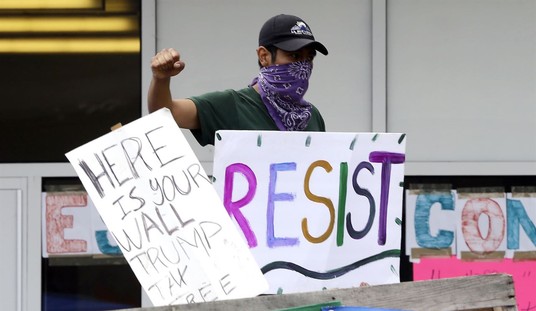This weekend, Texas Senator Ted Cruz followed President-elect Donald Trump’s lead in building a close relationship wtih Taiwan President Tsai Ing-wen.
Texas legislators, including Cruz and Texas Governor Greg Abbott, met Tsai in Houston on Saturday, rejecting a Chinese demand that lawmakers refuse to acknowledge her, The Washington Post reported.
“The People’s Republic of China needs to understand that, in America, we make decisions about meeting with visitors for ourselves,” Cruz declared in a statement following the meeting. “The Chinese do not give us veto power over those with whom they meet. We will continue to meet with anyone, including the Taiwanese, as we see fit.”
Cruz said he was “honored” to meet Tsai. “We discussed our mutual opportunity to upgrade the stature of our bilateral relations in a wide-ranging discussion that addressed arms sales, diplomatic exchanges, and economic relations,” the senator reported. “Further economic cooperation between our two nations must be a priority; increased access to Taiwanese markets will benefit Texas farmers, ranchers and small business owners alike.”
The Texas senator also mentioned receiving a “curious letter from the Chinese consulate” which asked members of Congress to avoid the meeting and uphold the “One-China policy.”
In response, Cruz declared that “the US-Taiwan relationship is not on the negotiating table.”
Honored to meet with President Tsai Ing-wen of Taiwan today. https://t.co/L7cDnFOv4S pic.twitter.com/mrDVwo4K5O
— Senator Ted Cruz (@SenTedCruz) January 8, 2017
“For U.S. leaders in administration and legislature, not to make any contact with Taiwan leaders nor send any implication of support of ‘Taiwan Independence’ are in the interests of China, the U.S. and the international community,” wrote Houston-based Chinese Consul General Li Qiangmin in a letter to Cruz, the Post reported.
“So, dear Senator, I sincerely hope that you will neither meet, nor have any contact with Tsai during her upcoming visit to Houston, and continue to play a significant role in promoting mutual understanding and friendship between the two people of China and the U.S.,” Li concluded.
Following President-elect Trump’s phone call with President Tsai in December, the People’s Republic of China stole an underwater drone from American ships in the South China Sea.
Contacts between the U.S. and Taiwan are controversial, because since 1979, America has acknowledged the People’s Republic of China as the only Chinese government. This “One China Policy” involves rejecting the claims of Taiwan, an independent state founded by Chinese Nationalist leader Chiang Kai-shek, who was defeated in 1949 by the Communist leader Mao Zedong.
The United States recognized the Nationalist government until 1979, but maintained an unofficial relationship with Taiwan since then. Trump’s approach — backed by Cruz and Abbott — seems to involve an official recognition of Taiwan’s government.
“It was an honor to meet with President Tsai and discuss how our two economies can expand upon our already prosperous trade partnership,” Governor Abbott declared in a statement Saturday. “Thanks to our favorable regulatory and legal climate, Texas remains and will continue to be a premier destination for Taiwanese businesses to expand and thrive.”
For her part, Tsai argued that “Texas and Taiwan share longstanding relationship based on trade, investment, and tourism.”
“In 2015, Taiwan was Texas’ 5th largest export market in Asia,” Tsai declared. “Texas has attracted more than US$ 10 billion [sic] in investment from Taiwan companies, such as Formosa Plastics, Foxconn, Inventec, and Eva Air. The edge which Texas holds in energy, biotechnology, smart machinery, and defense industries overlaps with the 5 major innovative industries which my administration has been promoting in Taiwan. Therefore, I believe there will be more opportunities for both sides to work even closer in the future.”
According to Abbott’s office, the Texas governor gave Tsai a clock bearing the Texas state seal, while the Taiwan president gave Abbott a Taiwanese vase.
Late Sunday night, the Chinese state-run Global Times warned that further “provocations” would result in more military pressure against Taiwan. “It is widely expected that the mainland will impose further military pressure,” the Times warned. “Tsai needs to face the consequences for every provocative step she takes.”
While Trump did not agree to meet with Tsai during her trip to the U.S., the paper warned against U.S-Taiwan relations. “In case he tears up the one-China policy after taking office, the mainland is fully prepared,” the Times warned. “Beijing would rather break ties with the US if necessary. We would like to see whether US voters will support their president to ruin Sino-US relations and destabilize the entire Asia-Pacific region.”
The Global Times further insisted that the “one-China policy” is “the foundation of the profound bilateral relationship. Sticking to this principle is not a capricious request by China upon US presidents, but an obligation of US presidents to maintain China-US relations and respect the existing order of the Asia-Pacific.”
“If Trump reneges on the one-China policy after taking office, the Chinese people will demand the government to take revenge. There is no room for bargaining.”
Who ever said 2017 couldn’t be even crazier than 2016?









Join the conversation as a VIP Member